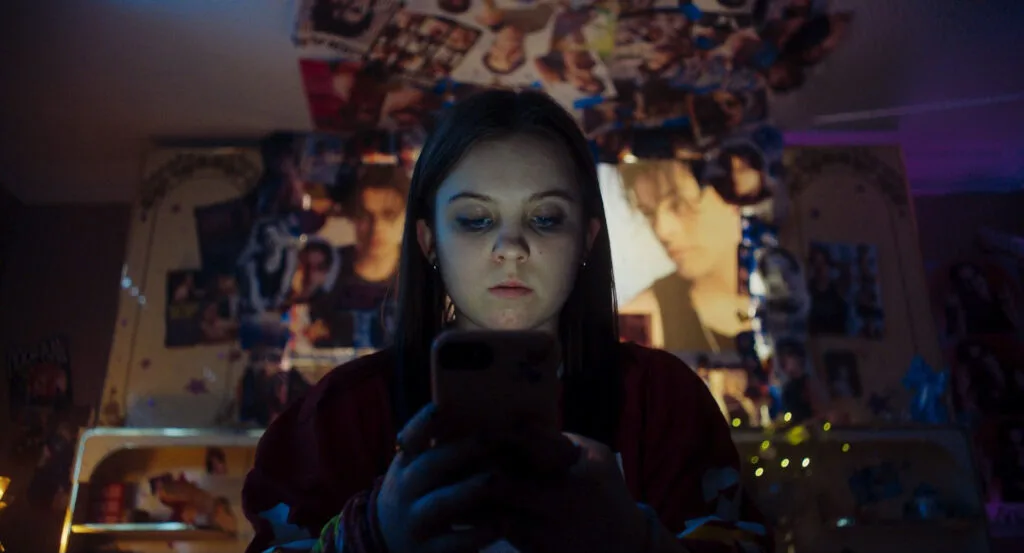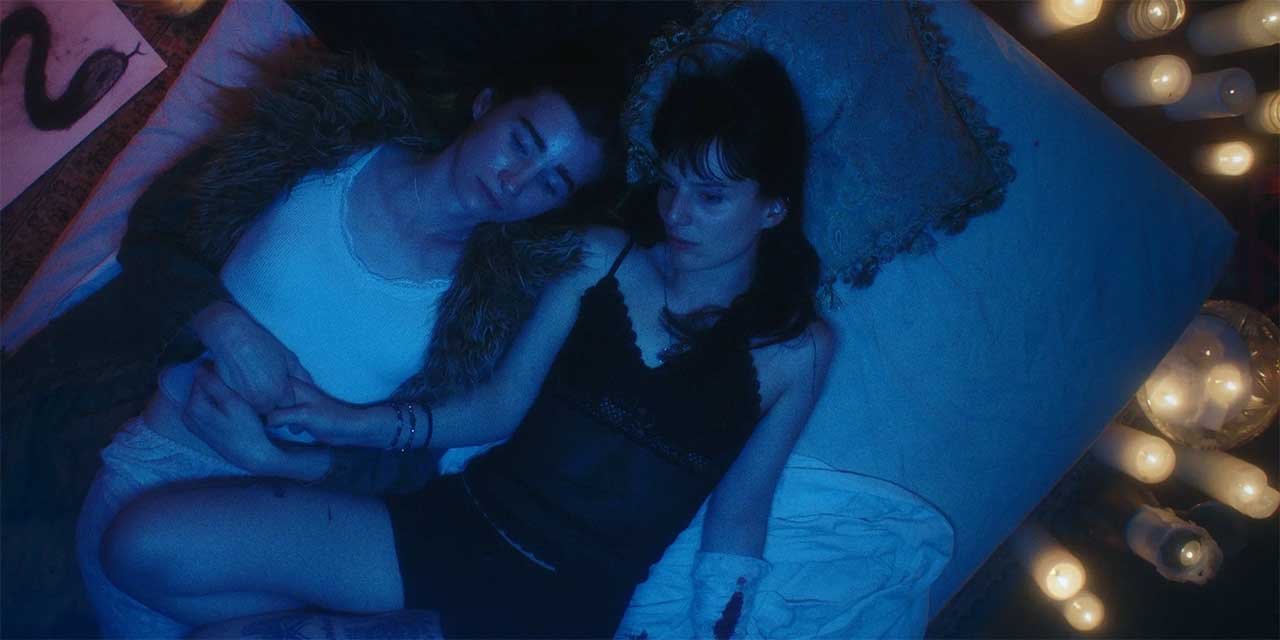Our next dispatch from the 2025 Fantasia International Film Festival turns its eyes on the plight of young women coming of age—amid a variety of genre turmoils, from ecological apocalypses to parasocial obsession to the thorny complications of nascent transfemininity.
First, of course, we must talk about “The Serpent’s Skin,” the latest “transgender film” (as the credits proudly blare) from Australian trans wunderkind Alice Maio Mackay, who at the tender age of twenty has already directed six feature films. (These include “T Blockers” and “Carnage for Christmas,” both of which have been featured at previous Fantasias). Mackay’s works have all had the charming DIY aesthetic of an Ed Wood, a student of film who just wants to make fun movies with her friends; but as she keeps iterating, her works become more assured in their craft, their focus, and (most importantly) their use of genre to explore the difficult experience of transness.
Here, in maybe Mackay’s most assured work yet, she builds a kind of “Scanners” for the dolls, as a young trans woman named Anna (Alexandre McVicker) moves in with her sister Dakota (Charlotte Chimes) to start over in a new place only to find herself with astonishing new mental abilities. These come, of course, after she has sex with the hottie in their building, Danny (Jordan Dulieu), whose fuckboi smolder is bolstered by the “FUCK TRUMP” tattoo on his arm and the casual, warm acceptance when Anna warns him that “I’m trans.”
This isn’t a love connection, though, as Anna quickly enters the orbit of Gen (Avalon Lux), a cool, disaffected tattoo artist who senses the nascent powers Anna holds. She, too, has mental powers, both of which allow them to mess with people’s minds and “pop” their brain cells if they try anything funny. The two fall into a whirlwind romance, as Gen teaches Anna how to master her powers and the pair struggle to navigate the complicated relational dynamics of their friend group (like so many Gen Z queer circles, it’s a messy mix of exes and crushes and jealousies). But their love, and the possessiveness therein, unleashes a demon that infects Danny, leaving them to figure out how best to save their community of friends.
Like Jane Schoenbrun, Mackay seemingly wears the influence of ’90s genre TV on her sleeve; both “I Saw the TV Glow” and “Serpent’s Skin” feel indebted to the soapy, hazy camp of supernatural teen thrillers like “Buffy the Vampire Slayer” and “The Craft.” But she filters these tales of outsiderdom and resilience through a trans lens; the central metaphor, a tattoo of an ouroboros which activates our characters’ powers, echoes the shedding of skin that happens, whether physically or figuratively, in transition. Beneath Mackay’s lo-fi presentation (the special effects carry their own low-rent charm), she demonstrates a remarkable sense of pace and craft for someone her age, whether in patient record store conversations or the care and heat of Anna’s encounters with either of her lovers throughout the film. Amid all the sapphic goth girl delights of “The Serpent’s Skin,” there’s a clarion call for community and its importance for queer people, messy and imperfect as it may be.

But sometimes, all a girl needs to worry about is the end of the world, which is where Hubert Davis’ “The Well” finds its central conflict. Its opening titles, which contrast footage of young girls swimming over news-anchor exposition of mankind’s water crisis, ease us into a “Last of Us”/”Walking Dead” esque post-apocalypse, but one of ecological disaster and drought rather than zombies. Still, the conceit remains a familiar one: A close-knit family, seen through the lens of young Sarah (Shailyn Pierre-Dixon) hides out on their family plot in the middle of the woods, tending to their garden and their animals, and (crucially) the well that provides them life-giving water in a world where that is extremely scarce. But their peace is threatened by the presence of a wounded young man named Jamie (Idrissa Sanogo), who comes across their camp and discovers their secret. However, what starts as a crisis becomes an opportunity, as the well itself needs a replacement filter, and his camp might be able to help. So against her parents’ wishes, Sarah runs off with Jamie to meet his group, led by mercurial leader Gabriel (Canadian screen legend Sheila McCarthy).
From there, “The Well” embarks on a patient—perhaps too patient—journey of discovery, as Sarah spends some time with Gabriel’s group, who make her feel actualized in a way her humdrum family life no longer did. How risky would it be to bring them back to benefit from their well? Does it benefit you, when the world has closed, to keep treating your fellow humans as community rather than as threats? Davis tries to weave these questions through every interaction, but there’s a listlessness to the script and pace that leaves these concerns feeling somewhat undercooked. The performances are universally sleepy, with only McCarthy being able to mine a kind of quiet profundity from her beleaguered leader. And the conflicts themselves rarely come to a head; it’s a dilemma delivered with too much understatement to really be effective. There’s hope at the end of the tunnel, but “The Well” unfortunately runs dry long before then.

Tales of obsession are nothing new, but at least Emma Higgins’ “Sweetness” plays the hits with remarkable style and an acid tongue. If “Serpent’s Skin” is Gen-Z “The Craft,” “Sweetness” is that generation’s “Misery,” following an awkward 16-year-old girl named Rylee (Kate Hallett), who weathers the miseries of school and her dad’s new girlfriend with her undying love for pop/rock idol Payton Adler (Herman Tømmeraas), who shyly discusses his newfound sobriety in puff-piece interviews she gorges on. She has a shrine of him erected in her bedroom, and even practices what she’d say if she ever got to meet, and seduce, him.
But when she and her best friend, Sidney (Aya Furukawa), go to a concert to see his band, Floorplan, fate collides Rylee and Payton together when she discovers that he’s still an addict, and has overdosed. One thing leads to another, and Payton ends up handcuffed to Rylee’s bed to get sober. But for Rylee, it becomes clear this one bad night has broader implications for her, as she takes her savior complex to dangerous, even deadly levels.
More than “Misery,” “Sweetness” also reminded me of the blinkered, disastrous third act of the equally miserable Weeknd film “Hurry Up Tomorrow,” in which a crazed fan ties him to a bed and demands he answer for his songs. But “Sweetness” handles this scenario with far more care, not least of which because it gives room for both of the complicated, sympathetic characters at its center. Rylee does a fair share of horrible things in her pursuit of Payton’s sobriety, confidence, and affection, but Hallett leavens these things with the kind of desperation that comes from truly believing you’re doing the right thing for someone. Tømmeraas, with his Robert Pattinson cheekbones and wild-eyed desperation, also manages to complicate our sympathies with his own mean streak and some relatable anguish about the nonstop pressures of celebrity life and drug addiction. (His songs, courtesy of Canadian composer trio Blitz//Berlin, adequately sell the catchy banality of his ballads, with the kinds of lyrics that fall on deaf ears to adults but are catnip to emotionally vulnerable teens like Rylee.)
As bad circumstances pile up, and Rylee’s struggle to control her spiraling situation grows ever more desperate, Higgins keeps ramping up the tension dial to unbearable volumes. And its final moments offer one final grim thumb in the eye to anyone expecting some kind of justice or accountability. But that’s life, and that’s “Sweetness.” And it’s very, very effective.












